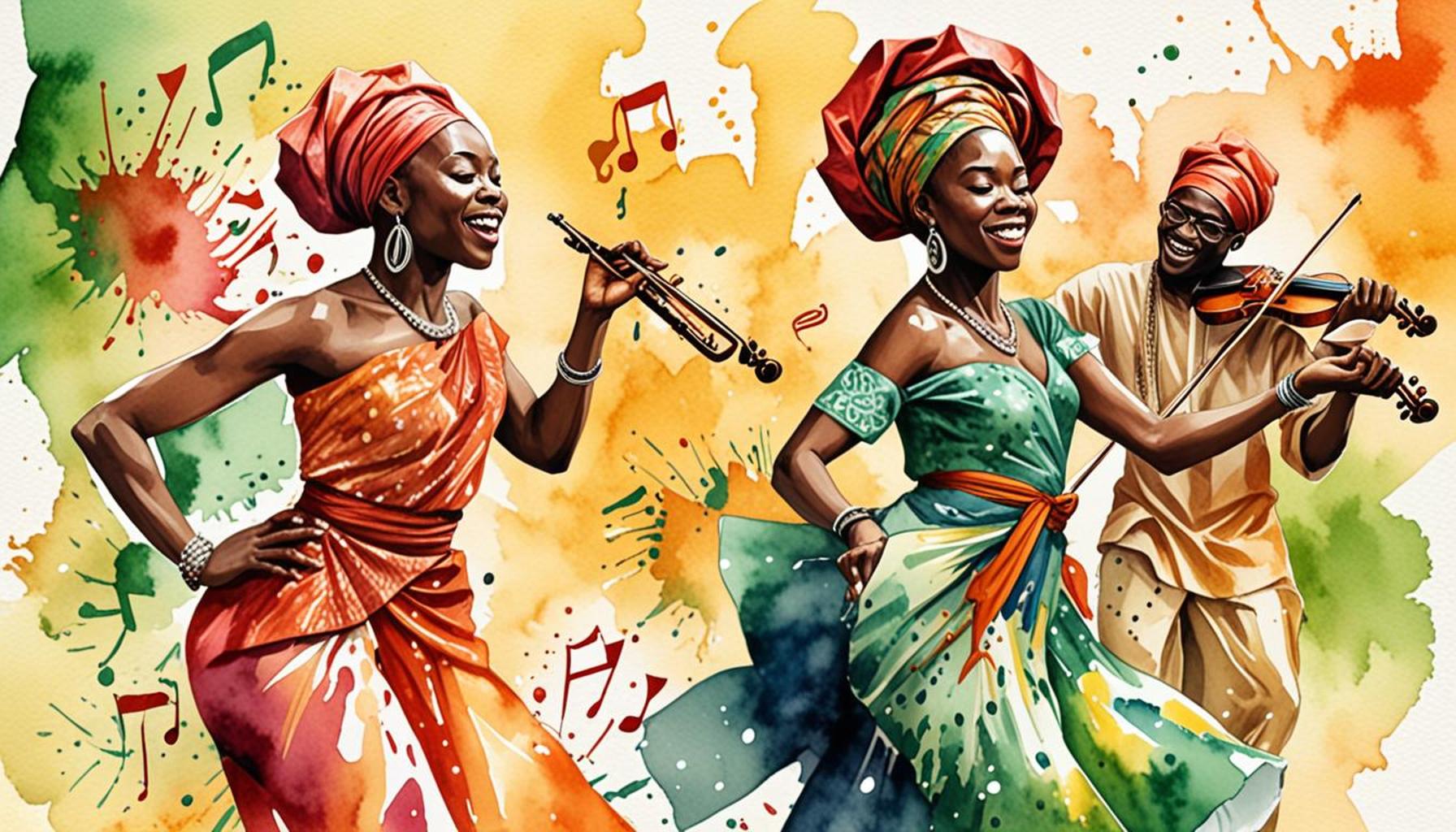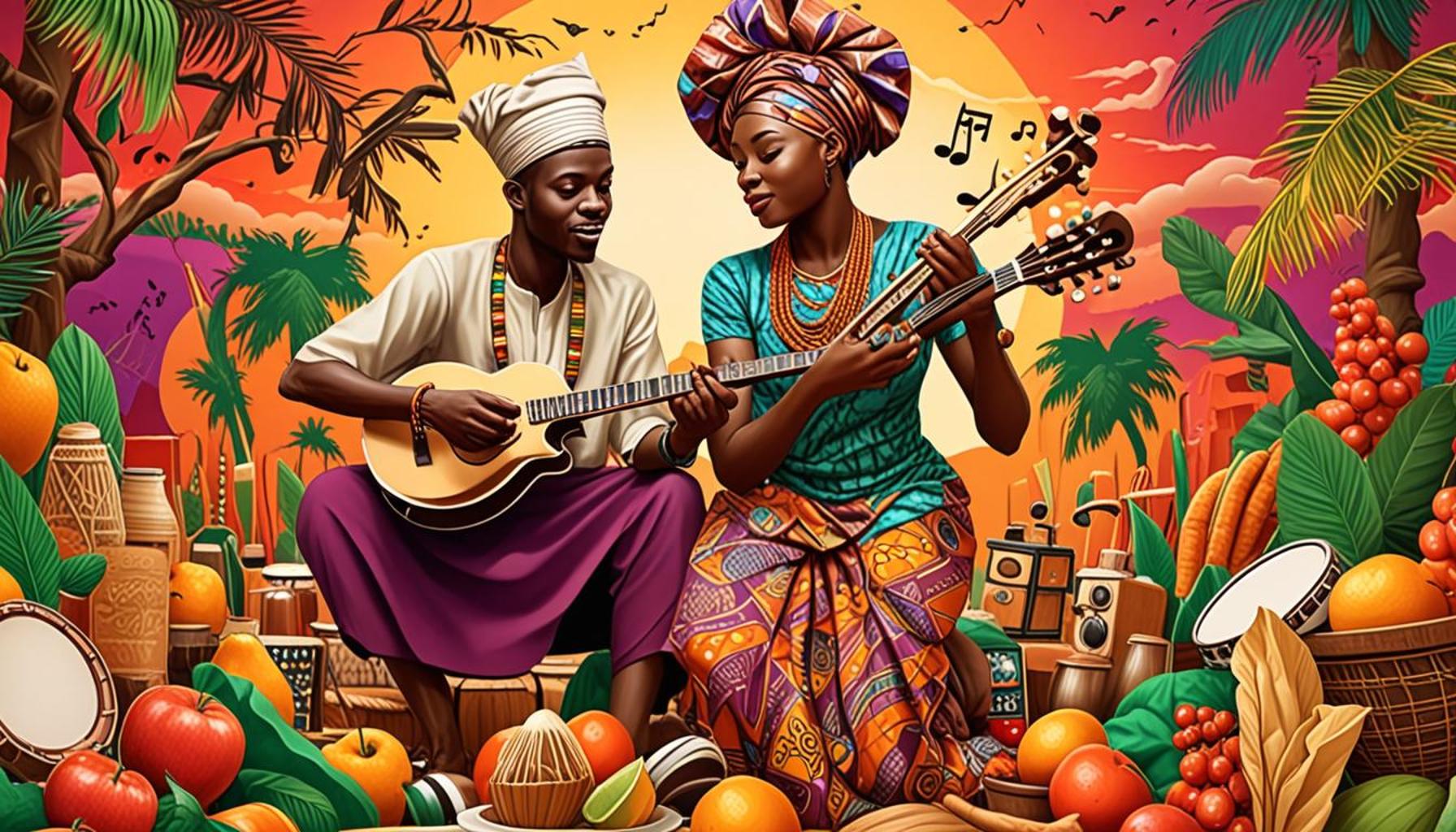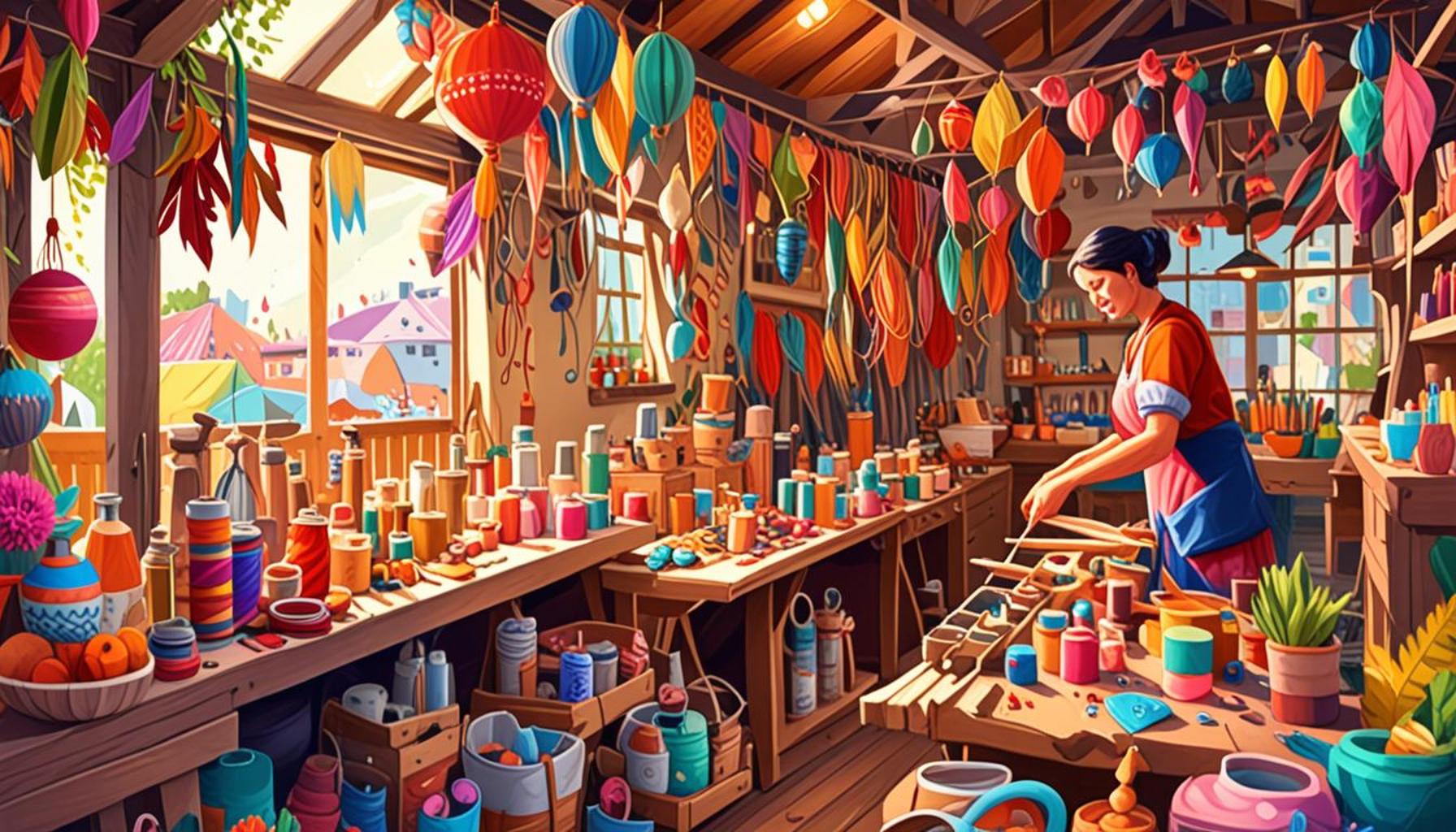Rhythms and Dances: A Cultural Journey through the Cities of Nigeria and Their Musical Celebrations

Exploring the Heartbeat of Nigeria
From the bustling streets of Lagos to the serene landscapes of Enugu, Nigeria is a vibrant mosaic of cultures, each with its own distinct rhythms and dances. These musical celebrations not only entertain but also serve as conduits for storytelling, preserving the rich heritage and history of the people. In Nigeria, performances burst forth with lively traditional instruments, colorful costumes, and communal festivities, all coming together to embody the essence of Nigerian culture.
A Kaleidoscope of Diversity
Nigeria is home to over 250 ethnic groups, each contributing uniquely to the nation’s rich musical heritage. For instance, Afrobeats, which has surged to the forefront of international music, originated in Lagos. With its infectious beats and vibrant melodies, Afrobeats integrates diverse styles, including jazz, highlife, and hip-hop, making it a modern symbol of Nigerian creativity. Artists like Burna Boy and Wizkid showcase this genre on the world stage, attracting global audiences.
Another example is Ekombi, a traditional dance of the Efik people, celebrated for its intricate movements that narrate tales of love, harvest, and daily life. This dance often accompanies local festivities, such as the Calabar Festival, where communities come together, dressed in beautiful attire.
In the northern regions, Gumbe is a celebrated dance often performed at ceremonies and communal celebrations, characterized by its fast-paced drumming and lively footwork. Meanwhile, Atilogwu, from the Southeast, is known for its energetic performances and vibrant costumes, often showcased during cultural festivals that emphasize the pride and resilience of the Igbo heritage.
Festivals like the Osun-Osogbo Festival, which honors the river goddess Osun, attract thousands to Osogbo, bringing together locals and visitors alike in a spectacular display of music, art, and spirituality. Similarly, the Calabar Carnival, dubbed Africa’s largest street party, transforms this southern city into a colorful arena of dance, music, and pageantry that echoes with the sounds of drums and the rhythm of life.
The Role of Music in Everyday Life
In Nigeria, music and dance transcend mere entertainment; they are integral to social cohesion and the preservation of cultural heritage. Whether during weddings, funerals, or local festivals, these celebrations create a strong sense of community, allowing people to bond, share joy, and reflect on collective experiences. Traditional songs may accompany rites of passage, while other tunes serve as rallying cries during social movements.
The embedded role of music in Nigerian life encourages people of all ages to participate actively, fostering connections that tie generations together. Each rhythm tells a story, each dance a history, and as you immerse yourself in the musical landscapes of Nigeria, you’ll uncover the unique rhythms and dances that embody the cultural journey of this incredible nation.
RECOMMENDED: Check out this similar article
Melodies of Tradition and Modernity
Nigeria’s cities pulsate with a distinctive energy, seamlessly intertwining traditional musical practices with contemporary influences. This vibrant fusion is evident in every corner, where local rhythms reflect the rich history and modern aspirations of the nation. In urban settings like Abuja and Port Harcourt, the sounds are a blend of drumming patterns, vocal styles, and melodic influences that celebrate both heritage and innovation.
From the City to the Stage
Each city contributes to this dynamic musical tapestry, showcasing a range of performances that draw crowds year-round. Major cities often host music festivals, which serve not just as entertainment but as platforms for cultural exchange. Some of the notable events include:
- The Lagos Music Festival – This annual event showcases a spectrum of musical genres, attracting both local and international artists. It’s a fantastic opportunity to experience the Afrobeats phenomenon live.
- The Abuja Carnival – A colorful celebration featuring parades, dance competitions, and traditional music, highlighting the capital city’s cultural diversity.
- The Jos Festival of Arts and Culture – Set in a city known for its rich ethnic blending, this festival honors the artistic expressions of different communities through music and performance.
These festivals not only entertain but also provide a glimpse into the country’s cultural panorama, where traditional messages are woven into modern expression. The exuberance of performers is palpable, as they engage with both the audience and each other in a shared celebration of Nigeria’s identity.
The Influence of Technology on Music
As technologies evolve, the way music and dance reach audiences has also transformed. Social media platforms like Instagram and TikTok have become powerful tools, facilitating the rise of new artists and trends. Vibrant dance challenges and viral songs emerge daily, reshaping the musical landscape. Yet, this modern twist does not overshadow traditional practices; rather, it enhances them. Younger generations are increasingly incorporating traditional dance styles into contemporary performances, ensuring that the ancestral rhythms continue to resonate.
Moreover, traditional instruments are being mixed with modern electronic elements, creating sounds that both honor the past and speak to the future. Iconic instruments such as the djembe, talking drum, and shekere can be heard alongside electric guitars and synthesizers, producing a unique soundscape that draws in listeners from all walks of life.
The convergence of tradition and modernity is not merely an adaptation but a celebration of Nigeria’s resilience as a nation. Each performance is a loving homage to the diversity and depth of its cultural history, inviting both locals and visitors to immerse themselves in the musical journey that defines this extraordinary nation.
Exploring Nigeria’s Vibrant Cultural Tapestry
Nigeria is a country rich in cultural diversity, with over 250 ethnic groups, each showcasing unique musical traditions and festivities. From the Afrobeat rhythms of Lagos to the traditional dances of the Northern tribes, every region offers a glimpse into its history and social values through music. These celebrations often coincide with significant events, such as festivals, weddings, and religious ceremonies, serving not just as entertainment but also as a medium for storytelling and community bonding.The guitar beats in the South resonate through the streets during the Osun-Osogbo Festival, while the masquerade dances in Eastern Nigeria tell tales of ancestral spirits and cultural heritage. Each performance is a fusion of art, spirituality, and communal ties, drawing locals and tourists alike to partake in these joyous occasions.Beyond the celebrations, the musical landscape of Nigeria has made significant contributions globally, influencing genres such as jazz and hip-hop. Music is a powerful vehicle for social change, allowing artists to address issues ranging from politics to personal struggles, making the voice of the people heard. Understanding these rhythms and dances offers deeper insight into Nigeria’s societal dynamics.To delve deeper into these cultural marvels, we can explore specific festivals in our forthcoming sections, analyzing their historical roots and contemporary relevance, inviting readers to experience the full spectrum of Nigeria’s musical journey.
| Advantages of Musical Celebrations | Importance of Cultural Heritage |
|---|---|
| Promotes Unity | Celebrates local traditions and fosters community spirit. |
| Encourages Tourism | Draws visitors seeking to experience unique cultural expressions. |
YOU MAY ALSO LIKE: Read read another article
Cultural Significance of Dance in Nigerian Music
Dance is not merely a form of entertainment in Nigeria; it is an integral part of the country’s cultural fabric. Each dance showcases the unique stories, values, and traditions of various ethnic groups, making it an essential vehicle for storytelling and social interaction. In cities like Calabar and Enugu, traditional dances are often performed during festivals, weddings, and various ceremonies, serving as a means of passing down heritage.
A Showcase of Ethnic Diversity
Nigeria is home to over 250 ethnic groups, each boasting its own distinct music and dance forms. For instance, the Ekpe Festival in Calabar is famous for its elaborate masquerades and vibrant dances, which celebrate the rich customs of the Efik people. Similarly, the Agba Traditional Dance in Enugu showcases the delightful *Igbo* culture through energetic movements and communal participation, drawing in audiences eager to witness the expressive power of dance.
Another exemplary dance is the Yoruba traditional dance, which is characterized by intricate footwork and vibrant costumes. The dance serves both ceremonial functions and social commentary, often reflecting on current events or traditional beliefs. Cities like Lagos and Ibadan are hotspots for this dance genre, especially during the Oshun-Osogbo Festival, where the river goddess is honored through music, dance, and rituals that mirror the spirituality of the Yoruba people.
Innovative Blends of Styles
The intermingling of traditional dance with modern street styles like Afrobeats and street dance has created electrifying performances that often captivate audiences both locally and globally. Artists like Davido and Tiwa Savage have popularized viral dance moves that originated in local communities, promoting a new dance culture while paying homage to their roots. Collaborations between traditional dancers and contemporary artists have produced a remarkable synergy that showcases the evolution of Nigerian dance.
Moreover, dance competitions such as Dance Nigeria Dance and the Nigerian Talent Show have become platforms for emerging talent, further blurring the lines between traditional and modern dance. These competitions encourage innovation while fostering pride in cultural identities, reminding participants and audiences alike of the shared history that defines Nigeria.
The Role of Dance in Community Building
Dance provides a unique opportunity for community bonding and empowerment. It fosters a sense of belonging and togetherness, particularly among younger generations who face the pressures of globalization. Events such as the Port Harcourt Carnival bring people of different backgrounds together, allowing them to collectively embrace the vibrancy of their culture through the joy of dance and music.
In addition, dance plays a vital role in social advocacy, acting as a tool for raising awareness about societal issues. Dances performed at rallies or events often convey powerful messages about unity or the struggles faced by communities, revealing the powerful voice that art can have in social change.
This profound connection between dance and community reveals the depth of Nigeria’s cultural identity, encapsulating the spirit of resilience and dynamism that resonates through the rhythms and melodies of its cities.
SEE ALSO: Click here to read another article
Conclusion: Celebrating Nigeria’s Vibrant Heritage
As we have explored the rich tapestry of Nigeria’s musical celebrations, it becomes evident that rhythms and dances serve as profound reflections of the nation’s identity. Each performance, whether during lively festivals or intimate communal gatherings, communicates the stories and values of Nigeria’s diverse ethnic groups. From the spirited dances of the Efik in Calabar to the graceful movements of the Yoruba in Lagos, these art forms foster unity and cultural pride, connecting generations through the shared experience of rhythm.
In an era of globalization, the innovative blends of traditional and contemporary styles remind us of the adaptability and creativity of Nigerian artists. By maintaining their roots while embracing modern influences, they pave the way for a vibrant dance culture that captivates both local and international audiences. The emergence of platforms like Dance Nigeria Dance not only highlights talented performers but also revitalizes the communal spirit that dance embodies.
Moreover, the role of dance extends beyond entertainment; it functions as a critical tool for social change and advocacy. By addressing societal issues through artistic expression, dancers become catalysts for dialogue and awareness. Events like the Port Harcourt Carnival serve as a testament to how dance can unite diverse communities in celebration of their shared heritage.
In discovering the dynamic rhythms and expressive dances of Nigeria, we uncover a cultural journey rich with history and inspiration. There is much more to uncover; by continuing to engage with and celebrate these traditions, we ensure that the spirit of Nigeria’s cultural legacy lives on for future generations.


